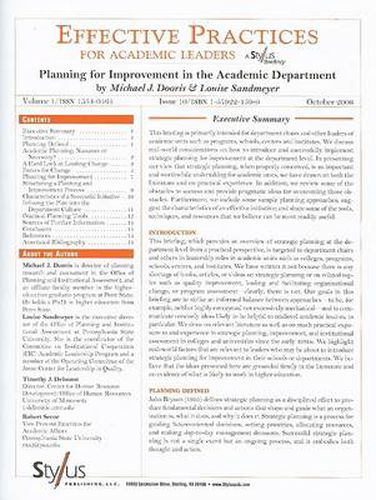Readings Newsletter
Become a Readings Member to make your shopping experience even easier.
Sign in or sign up for free!
You’re not far away from qualifying for FREE standard shipping within Australia
You’ve qualified for FREE standard shipping within Australia
The cart is loading…






Executive Summary In this briefing I describe trends in higher education that impact the hiring and success of tenure-track faculty: increasing competition for the best and the brightest, the generational change expected as a cohort of retiring senior faculty is replaced by a new generation, and expanding roles for faculty as external influences widen expectations for higher education. I review some of the research on expectations and concerns of early-career faculty, highlighting particularly the difficulties young faculty members have identified in (1) understanding and achieving expectations for tenure and promotion, (2) becoming socialized in their institutions and departments and finding colleagues with whom to collaborate, and (3) balancing the multiple demands of jobs and personal and family responsibilities.
In addition, I explore the multiple forms of scholarship in which new faculty members are often expected to become engaged, along with the risks associated with expanded expectations and the resulting overloaded plate. By reviewing the results from job-satisfaction surveys of tenure-track faculty, with attention to the expectations of women and minority faculty and faculty at different types of institutions, I have identified what administrators can learn about creating competitive academic workplaces. Among the factors affecting workplace satisfaction for early-career faculty is work-life balance. I include a review of recent efforts to implement policies and practices to assist faculty, particularly early-career faculty, in balancing work and family responsibilities. Finally, I provide a list of questions that chairs and their departments can ask themselves about the support that they provide early-career faculty, and I present professional development resources. The briefing identifies the important role of the department chair in providing new faculty members–indeed, all faculty members–a supportive environment that offers clearly defined expectations and appropriate rewards, a balanced work life, and opportunities for collegiality and community.
$9.00 standard shipping within Australia
FREE standard shipping within Australia for orders over $100.00
Express & International shipping calculated at checkout
Executive Summary In this briefing I describe trends in higher education that impact the hiring and success of tenure-track faculty: increasing competition for the best and the brightest, the generational change expected as a cohort of retiring senior faculty is replaced by a new generation, and expanding roles for faculty as external influences widen expectations for higher education. I review some of the research on expectations and concerns of early-career faculty, highlighting particularly the difficulties young faculty members have identified in (1) understanding and achieving expectations for tenure and promotion, (2) becoming socialized in their institutions and departments and finding colleagues with whom to collaborate, and (3) balancing the multiple demands of jobs and personal and family responsibilities.
In addition, I explore the multiple forms of scholarship in which new faculty members are often expected to become engaged, along with the risks associated with expanded expectations and the resulting overloaded plate. By reviewing the results from job-satisfaction surveys of tenure-track faculty, with attention to the expectations of women and minority faculty and faculty at different types of institutions, I have identified what administrators can learn about creating competitive academic workplaces. Among the factors affecting workplace satisfaction for early-career faculty is work-life balance. I include a review of recent efforts to implement policies and practices to assist faculty, particularly early-career faculty, in balancing work and family responsibilities. Finally, I provide a list of questions that chairs and their departments can ask themselves about the support that they provide early-career faculty, and I present professional development resources. The briefing identifies the important role of the department chair in providing new faculty members–indeed, all faculty members–a supportive environment that offers clearly defined expectations and appropriate rewards, a balanced work life, and opportunities for collegiality and community.